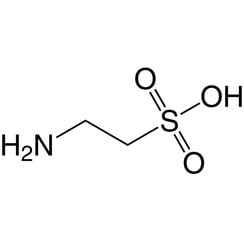You have no items in your shopping cart
Taurine
Taurine or 2-aminoethanesulfonic acid, is an organic compound that is widely distributed in animal tissues. It is a major constituent of bile and can be found in the large intestine, and accounts for up to 0.1% of total human body weight. Taurine is named after the Latin taurus (a cognate of the Greek ταῦρος) which means bull or ox, as it was first isolated from ox bile in 1827 by German scientists Friedrich Tiedemann and Leopold Gmelin. It was discovered in human bile in 1846 by Edmund Ronalds.
Taurine has many biological roles, such as conjugation of bile acids, antioxidation, osmoregulation, membrane stabilization, and modulation of calcium signaling. It is essential for cardiovascular function, and development and function of skeletal muscle, the retina, and the central nervous system.
Taurine is an unusual example of a naturally occurring sulfonic acid.

